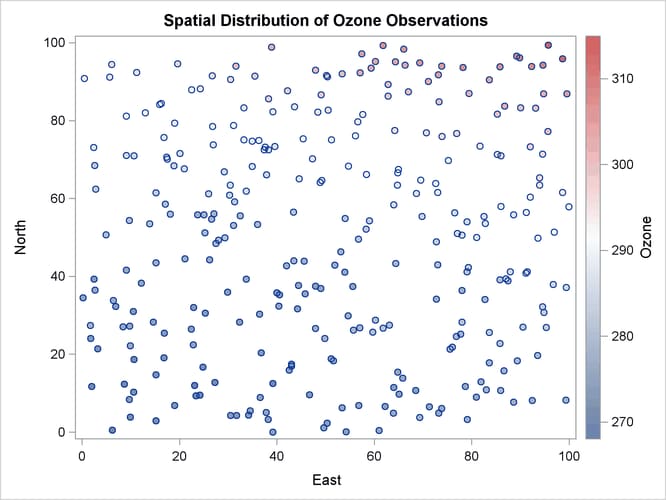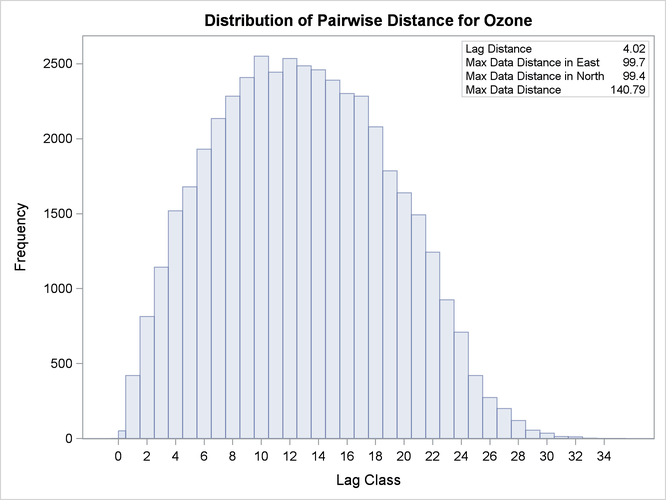The VARIOGRAM Procedure
Example 102.2 An Anisotropic Case Study with Surface Trend in the Data
This example shows how to examine data for nonrandom surface trends and anisotropy. You use simulated data where the variable
is atmospheric ozone (O![]() ) concentrations measured in Dobson units (DU). The coordinates are offsets from a point in the southwest corner of the measurement
area, with the east and north distances in units of kilometers (km). You work with the
) concentrations measured in Dobson units (DU). The coordinates are offsets from a point in the southwest corner of the measurement
area, with the east and north distances in units of kilometers (km). You work with the ozoneSet data set that contains 300 measurements in a square area of 100 km ![]() 100 km.
100 km.
The following statements read the data set:
title 'Semivariogram Analysis in Anisotropic Case With Trend Removal'; data ozoneSet; input East North Ozone @@; datalines; 34.9 68.2 286 39.2 12.5 270 44.4 37.7 275 90.5 27.0 282 91.1 40.8 285 98.6 61.6 294 61.8 26.7 281 64.0 11.5 274 22.4 26.5 274 89.3 18.3 279 32.3 28.3 274 31.1 53.1 279 43.0 17.5 272 79.3 42.3 283 99.9 57.9 291 1.8 24.1 273 81.7 73.5 294 22.9 32.0 273 64.9 67.5 292 76.5 56.3 285 78.7 11.7 276 61.8 99.3 307 49.1 86.6 299 40.0 35.8 273 69.3 3.8 278 23.4 9.3 270 66.3 94.3 304 71.3 6.5 275 9.7 54.4 280 85.2 81.7 300 30.3 60.9 284 94.6 94.3 309 10.6 10.3 271 73.0 43.0 280 4.9 50.7 280 19.0 79.4 289 2.4 73.1 287 77.7 25.2 278 8.4 27.1 276 93.5 19.7 279 0.2 34.5 275 50.4 91.3 302 55.7 26.2 279 50.3 2.3 274 16.3 84.4 293 19.0 6.9 272 57.1 92.3 303 61.0 0.4 275 10.7 18.7 271 15.2 43.5 277 67.0 87.4 301 79.0 54.0 285 36.0 53.3 279 58.3 52.1 282 56.6 79.7 294 40.4 32.4 275 48.9 64.1 286 54.0 54.9 281 27.5 48.5 279 36.4 30.3 275 10.5 31.0 273 87.0 39.4 283 47.9 37.5 274 64.7 63.4 288 0.5 90.8 294 22.8 22.4 275 31.1 78.8 291 93.6 49.8 290 2.5 39.3 273 83.6 25.6 282 49.8 24.1 278 73.1 91.8 305 30.5 90.6 297 26.0 61.2 284 58.4 66.2 289 30.5 4.3 273 38.3 85.6 298 89.2 96.6 309 53.4 6.3 275 27.3 12.8 271 43.4 56.5 281 99.5 86.9 305 85.8 22.8 281 83.0 10.9 278 24.8 16.7 271 51.1 18.8 275 59.0 54.3 283 35.5 91.4 298 18.1 56.0 279 78.0 36.4 277 56.8 6.9 275 21.1 44.5 277 73.9 75.9 296 54.2 0.1 274 33.2 75.1 290 38.2 3.3 274 15.2 14.7 272 15.9 84.2 292 60.2 95.2 304 9.8 27.2 276 91.2 56.4 289 94.7 86.9 303 56.7 49.6 281 24.2 9.5 270 43.0 17.0 272 85.9 10.7 278 53.9 41.1 276 30.4 63.4 286 62.8 86.3 299 76.8 24.6 279 31.6 94.0 300 26.9 73.8 287 18.9 68.4 284 99.4 37.2 285 79.1 3.3 277 34.9 74.7 289 6.4 33.8 277 48.4 82.2 294 86.0 58.0 289 92.0 60.4 293 50.2 91.6 300 12.2 38.3 275 72.7 48.9 283 82.7 34.1 279 77.0 51.0 286 86.6 15.8 278 42.0 42.7 277 99.3 8.2 278 17.4 70.6 286 11.2 92.4 295 60.2 28.8 280 92.0 73.3 297 25.3 30.6 273 36.6 8.9 274 34.2 4.4 273 26.6 54.7 278 1.7 27.4 278 49.6 1.1 275 62.8 89.3 301 28.0 49.3 279 51.2 75.1 293 59.3 93.5 304 83.6 90.5 304 79.4 87.0 302 78.0 28.3 281 16.8 19.1 272 9.1 81.2 292 23.7 55.8 277 75.5 21.3 279 64.4 43.3 279 38.9 98.9 303 22.5 87.9 293 96.7 37.9 285 92.3 93.9 308 16.9 25.4 273 15.2 61.5 283 73.8 94.0 306 57.4 97.2 305 73.2 4.9 276 39.2 82.3 294 95.7 99.4 315 66.0 98.4 306 95.3 26.9 283 45.4 75.3 291 64.8 15.4 276 69.8 55.4 284 36.3 74.9 290 9.9 22.2 276 65.8 13.9 276 13.0 82.0 293 95.6 77.2 301 32.5 55.6 279 45.8 35.5 275 62.2 6.6 274 25.2 51.2 279 92.4 8.1 277 40.5 35.3 273 9.9 3.9 271 43.5 44.0 278 68.6 61.3 287 64.2 77.5 296 57.6 81.6 294 69.5 64.7 291 64.3 95.1 304 2.8 62.4 283 33.2 83.3 294 10.7 71.0 285 24.3 88.2 294 94.5 32.2 283 21.0 67.6 286 20.1 71.6 286 85.2 71.3 296 94.8 30.7 283 53.4 92.0 301 81.0 50.0 287 54.6 29.9 277 71.1 90.1 303 15.2 2.9 271 83.6 17.8 278 76.0 21.8 279 55.6 37.4 275 86.7 83.7 303 43.6 83.6 295 44.2 31.7 274 90.0 83.3 300 6.2 0.5 270 42.2 87.7 298 31.7 4.3 273 91.4 41.2 285 78.0 50.6 286 27.1 56.1 278 72.6 63.9 291 29.3 49.9 281 49.0 36.9 275 13.9 53.5 280 93.1 83.2 300 73.0 61.6 289 63.1 27.5 280 38.3 72.5 287 72.7 34.2 277 6.9 32.3 274 17.1 58.6 280 19.6 94.6 297 2.7 36.5 276 34.5 5.5 275 98.6 95.9 313 9.1 71.1 285 88.6 55.8 287 26.8 78.5 289 64.8 66.6 292 59.7 25.7 280 47.3 70.2 288 6.1 94.4 296 50.5 82.7 296 9.1 41.6 276 86.0 71.0 296 75.2 69.8 293 73.3 84.8 300 42.5 15.9 274 56.1 76.1 292 87.9 41.2 285 65.1 9.8 274 79.0 41.2 282 44.6 65.1 287 54.7 68.3 289 57.0 26.8 279 8.7 12.3 270 33.7 61.9 286 25.0 55.8 278 69.3 94.9 306 49.2 64.6 287 78.2 93.7 307 47.9 26.6 277 96.9 51.4 292 39.6 73.4 287 37.9 66.1 285 94.5 71.4 296 51.6 18.3 276 37.6 73.2 287 68.5 10.7 274 46.7 9.6 273 87.4 38.9 282 45.6 43.9 277 70.7 76.9 296 82.8 53.6 287 82.5 55.4 286 37.8 5.1 275 89.8 96.1 309 63.9 4.9 276 2.0 11.7 270 31.3 59.2 282 93.9 65.3 296 47.9 93.0 301 29.9 36.0 274 14.6 28.3 274 17.5 70.1 286 2.6 68.5 282 23.1 12.0 268 36.8 20.4 273 80.9 9.0 276 39.2 0.0 274 26.2 44.3 276 81.9 12.9 277 3.2 21.4 272 76.9 76.7 297 88.6 7.7 277 9.7 8.4 273 26.7 91.5 296 73.8 6.1 276 33.7 39.3 276 64.0 58.4 286 5.7 91.2 295 85.8 93.8 307 85.8 39.1 281 93.9 63.4 295 53.1 46.3 278 51.9 42.9 277 16.8 75.7 288 29.2 66.9 285 37.4 72.5 287 ;
The initial step is to explore the data set by inspecting the data spatial distribution. Run PROC VARIOGRAM, specifying the NOVARIOGRAM option in the COMPUTE statement as follows:
ods graphics on;
proc variogram data=ozoneSet; compute novariogram nhc=35; coord xc=East yc=North; var Ozone; run;
The result is a scatter plot of the observed data shown in Output 102.2.1. The scatter plot suggests an almost uniform spread of the measurements throughout the prediction area. No direct inference can be made about the existence of a surface trend in the data. However, the apparent stratification of ozone values in the northeast–southwest direction might indicate a nonrandom trend.
Output 102.2.1: Ozone Observation Data Scatter Plot

You need to define the size and count of the data classes by specifying suitable values for the LAGDISTANCE= and MAXLAGS= options, respectively. Compared to the smaller sample of thickness data used in Getting Started: VARIOGRAM Procedure, the larger size of the ozoneSet data results in more densely populated distance classes for the same value of the NHCLASSES= option. After you experiment with a variety of values for the NHCLASSES= option, you can adjust LAGDISTANCE= to have a relatively small number. Then you can account for a large value of MAXLAGS= so that you obtain many sample semivariogram points within your data correlation range. Specifying these values requires
some exploration, for which you might need to return to this point from a later stage in your semivariogram analysis. For
illustration purposes you now specify NHCLASSES=35.
Your choice of NHCLASSES=35 yields the pairwise distance intervals table in Output 102.2.2 and the corresponding histogram in Output 102.2.3.
Output 102.2.2: Pairwise Distance Intervals Table
| Pairwise Distance Intervals | ||||
|---|---|---|---|---|
| Lag Class |
Bounds | Number of Pairs | Percentage of Pairs |
|
| 0 | 0.00 | 2.01 | 52 | 0.12% |
| 1 | 2.01 | 6.03 | 420 | 0.94% |
| 2 | 6.03 | 10.06 | 815 | 1.82% |
| 3 | 10.06 | 14.08 | 1143 | 2.55% |
| 4 | 14.08 | 18.10 | 1518 | 3.38% |
| 5 | 18.10 | 22.12 | 1680 | 3.75% |
| 6 | 22.12 | 26.15 | 1931 | 4.31% |
| 7 | 26.15 | 30.17 | 2135 | 4.76% |
| 8 | 30.17 | 34.19 | 2285 | 5.09% |
| 9 | 34.19 | 38.21 | 2408 | 5.37% |
| 10 | 38.21 | 42.24 | 2551 | 5.69% |
| 11 | 42.24 | 46.26 | 2444 | 5.45% |
| 12 | 46.26 | 50.28 | 2535 | 5.65% |
| 13 | 50.28 | 54.30 | 2487 | 5.55% |
| 14 | 54.30 | 58.33 | 2460 | 5.48% |
| 15 | 58.33 | 62.35 | 2391 | 5.33% |
| 16 | 62.35 | 66.37 | 2302 | 5.13% |
| 17 | 66.37 | 70.39 | 2285 | 5.09% |
| 18 | 70.39 | 74.41 | 2079 | 4.64% |
| 19 | 74.41 | 78.44 | 1786 | 3.98% |
| 20 | 78.44 | 82.46 | 1640 | 3.66% |
| 21 | 82.46 | 86.48 | 1493 | 3.33% |
| 22 | 86.48 | 90.50 | 1243 | 2.77% |
| 23 | 90.50 | 94.53 | 925 | 2.06% |
| 24 | 94.53 | 98.55 | 710 | 1.58% |
| 25 | 98.55 | 102.57 | 421 | 0.94% |
| 26 | 102.57 | 106.59 | 274 | 0.61% |
| 27 | 106.59 | 110.62 | 200 | 0.45% |
| 28 | 110.62 | 114.64 | 120 | 0.27% |
| 29 | 114.64 | 118.66 | 55 | 0.12% |
| 30 | 118.66 | 122.68 | 35 | 0.08% |
| 31 | 122.68 | 126.71 | 14 | 0.03% |
| 32 | 126.71 | 130.73 | 11 | 0.02% |
| 33 | 130.73 | 134.75 | 2 | 0.00% |
| 34 | 134.75 | 138.77 | 0 | 0.00% |
| 35 | 138.77 | 142.80 | 0 | 0.00% |
Notice the overall high pair count in the majority of classes in Output 102.2.2. You can see that even for higher values of NHCLASSES= the classes are still sufficiently populated for your semivariogram analysis according to the rule of thumb stated in the section Choosing the Size of Classes. Based on the displayed information in Output 102.2.3, you specify LAGDISTANCE=4 km. You can further experiment with smaller lag sizes to obtain more points in your sample semivariogram.
You can focus on the MAXLAGS= specification at a later point. The important step now is to investigate the presence of trends in the measurement. The following section makes a suggestion about how to remove surface trends from your data and then continues the semivariogram analysis with the detrended data.
Output 102.2.3: Distribution of Pairwise Distances for Ozone Observation Data

